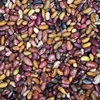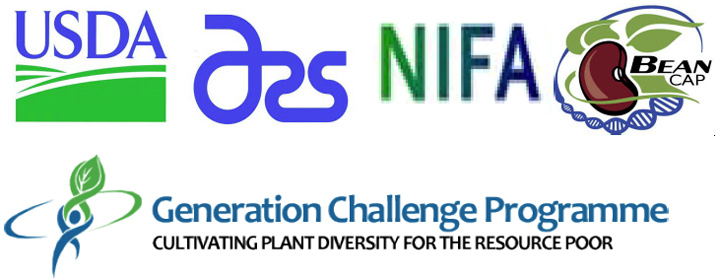A boon to bean breeding in the tropics
- Friday, 14 October 2011 00:00

Scaling to thousands: A first ever for beans, BeanCAP’s landmark donation will greatly accelerate the quest for better beans
| BELTSVILLE (MD), USA – The Bean Coordinated Agricultural Project (BeanCAP) is pleased to announce the release – into the public domain – of the first instalment of resources to boost molecular breeding in common beans. BeanCAP is releasing to the Generation Challenge Programme (GCP) of the Consultative Group on International Agricultural Research (CGIAR) information on more than 1,575 bean SNPs that will broaden the genetic tools available to developing-country bean breeders. |

FOR IMMEDIATE RELEASE TO MARK WORLD FOOD DAY ON 16 OCTOBER
MEDIA RELEASE – 14 October 2011
A boon to bean breeding in the tropics
Scaling to thousands: A first ever for beans, BeanCAP’s landmark donation will greatly accelerate the quest for better beans
BELTSVILLE (MD), USA – The Bean Coordinated Agricultural Project (BeanCAP) is pleased to announce the release – into the public domain – of the first instalment of resources to boost molecular breeding in common beans. BeanCAP is releasing to the Generation Challenge Programme (GCP) of the Consultative Group on International Agricultural Research (CGIAR) information on more than 1,575 bean SNPs that will broaden the genetic tools available to developing-country bean breeders. ‘SNPs’ (pronounced ‘snips’) is a technical term, and the abbreviation is derived from ‘single nucleotide polymorphism’ – an advanced molecular-marker system widely used in genetic science, but SNPs have not been available in critical amounts to bean breeders until this landmark release. By reducing not only time but also cost, the use of SNPs for molecular breeding greatly increases the efficiency of crop breeding. This means it has high potential for improving food production in the tropics by developing new varieties better adapted to increasing environmental challenges.
Common beans (Phaseolus vulgaris L) comprise the world’s most important food legume, feeding about 375 million people in Latin America and 200 million people in sub-Saharan Africa. Their nutritional value is so high, they have been called ‘a near-perfect food’. They are also easy to grow, adapting readily to different cropping systems and maturing quickly.
The USA BeanCAP team of plant breeders and geneticists is led by Dr Phil McClean, BeanCAP Project Director, and Researcher at North Dakota State University. The SNP marker development and evaluation was conducted by Dr Perry Cregan, a BeanCAP team member, and legume Research Leader at the Agricultural Research Service of the United States Department of Agriculture (USDA–ARS) in Beltsville, Maryland. “These SNPs were evaluated on 384 bean cultivars, including cultivars of Mesoamerican and Andean origin,” clarified Dr Cregan. “The SNPs donated to GCP fall into two groups: one selected to function well in the Mesoamerican and the other in Andean germplasm. Both sets will be suitable for applications in the breeding of tropical bean germplasm.”
The development of SNPs and other genetic marker technologies and their application in plant breeding have dramatically shrunk the time and cost required for developing new genetically improved plant varieties. “The BeanCAP team is particularly pleased that the SNP genetic markers we are developing and applying will rapidly find their way to applications in common bean breeding in developing countries where common beans are such an important dietary component,” added Dr Cregan.
“This transfer is consistent with the USDA Feed the Future commitment to be actively engaged in global food security efforts,” Dr McClean observed “It supports the research objective to seek gains in productivity through adoption of improved technologies that will promote development of more nutritious, environmentally sustainable and climate-resilient crops. Transfer of these molecular markers is consistent with a USDA strategy that envisions outcomes that will deliver scientific breakthroughs, and research to promote adoption of the best science through links with private-sector research partners and international agencies.”
BeanCAP will partner with GCP to aid in the dissemination of the SNPs to developing-country researchers. "GCP works with a wide network of partners within and outside the CGIAR system, and this should ensure broad dissemination of these new bean resources to researchers across the world, particularly in the global South," said Dr Xavier Delannay, Leader of Integrated Crop Breeding at GCP. “The BeanCAP SNPs are a welcome and much-needed resource for bean molecular breeding since sufficient SNPs had not been previously available for this critical food crop.”
In collaboration with the International Center for Tropical Agriculture (CIAT, by its Spanish acronym), GCP will handle the conversion of the SNPs received from BeanCAP to the KBioscience KASPar platform, which facilitates the high-throughput application of SNP markers in breeding programmes. The SNPs will be available through the Marker Services that GCP offers as part of its Integrated Breeding Platform, a public web-based one-stop shop for information, analytical tools and related services to design and efficiently conduct molecular-assisted breeding experiments (www.generationcp.org/ibp). Developing countries stand to benefit from this donation since BeanCAP is making these SNPs available to GCP without any restrictions.
GCP is coordinating a number of initiatives aimed at increasing the integration of molecular markers into developing-country breeding programs, in order to accelerate the development of improved varieties better-adapted to drought and other challenges. Due to their low cost and high-throughput potential, it is critical to expose breeders in developing countries to marker technologies as a valuable additional asset in their toolbox for enhancing crop productivity in drought-prone environments.
“Ensuring the availability of a sufficient quantity of SNPs for the main food crops in developing countries continues to be a key priority for GCP, and this collaboration with BeanCAP will enable us to fulfil this goal for common beans,” adds Dr Delannay. “It will directly boost the capacity of GCP-supported bean projects, such as those initiated through GCP’s Tropical Legumes I [TLI] project focussing on Africa, and mainly funded by the Bill & Melinda Gates Foundation. It will also be beneficial to many other bean-breeding programs in the developing world.”
Implemented by CIAT in collaboration with local partners, the bean work in TLI targets Ethiopia, Kenya, Malawi, Tanzania and Zimbabwe. In addition, GCP also funds bean research in Latin America (Mexico and Nicaragua) implemented by country partners from national programmes in close collaboration with CIAT.
For more details, please contact This email address is being protected from spambots. You need JavaScript enabled to view it. or This email address is being protected from spambots. You need JavaScript enabled to view it. .
About BeanCAP
BeanCAP is funded by the USDA’s National Institute of Food and Agriculture (NIFA) and includes collaborations of bean researchers from six state universities and five USDA–ARS locations. BeanCAP’s major objectives are: 1) discovery of genetic markers associated with common bean nutritional traits as well as disease and environmental stresses that impact bean productivity, and, 2) application of genetic marker technology to rapidly develop bean varieties with improved nutritional traits and resistance to disease and other stresses that reduce productivity.
The BeanCAP research fits well with ‘Feed the Future’ – a joint effort of the US Department of State, the US Agency for International Development (USAID) and the USDA to leverage investments by the USDA in research that benefits US agriculture in new ways and that can also benefit developing-country farmers. Major crop diseases are key examples where ‘dual-use’ technologies can have broad applicability. US farmers benefit because overseas research partnerships provide important first-line defences or early warnings against new types of plant pests and emerging diseases.
About the CGIAR Generation Challenge Programme (GCP)
Created by the Consultative Group on International Agricultural Research (CGIAR) in 2003 as a time-bound 10-year Programme, the mission of the CGIAR Generation Challenge Programme (GCP) is to use genetic diversity and advanced plant science to improve crops by adding value to breeding for drought-prone and harsh environments. This is achieved through a network of more than 200 partners drawn from CGIAR Centres, academia, regional and national research programmes, and capacity enhancement to assist developing-world researchers to access technologies and to tap into a broader and richer pool of plant genetic diversity.
GCP’s workplan for Phase II (2009–2014) is building on a set of seven crop-and region-specific Research Initiatives (RIs) focusing on drought tolerance for nine key crops, and on an integrated service component. While the RIs aim to demonstrate – through selected user cases – that modern and integrated breeding approaches can have a significant impact on crop productivity in developing countries, the service component (the Integrated Breeding Platform, [IBP]) is conceived as a vehicle for dissemination of knowledge and technology, enabling broad access to and proactive distribution of crop genetic stocks and breeding material; molecular, genomics and informatics technology and information; cost-effective high-throughput laboratory services; and capacity building programmes.


